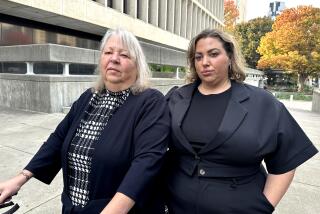Ailing Mother : Bid to Pull Life Support Plug Fails
- Share via
A Los Angeles Superior Court judge refused Monday to order a Covina hospital to disconnect an 81-year-old woman from a mechanical breathing device from which she has repeatedly asked to be removed.
In light of a declaration from the woman’s primary physician that each time he has attempted to wean her from the respirator she has “gone into respiratory distress and requested to be placed back on the ventilator,” Judge Norman L. Epstein denied the request of the family’s lawyer.
“I have to assume that what he is connoting (from her behavior when taken off the machine) is a deliberate conscious communication to the physician to restore the device,” Epstein said.
Daughters of Mary L. Lawrence said after the hearing that “that isn’t what she is saying at all.”
Request Made
“She has asked to be disconnected dozens of times,” they said.
“I am very angry and very, very hurt,” said Odella Sandow of Azusa, 63. “Why? Because I love my mother, and I don’t want to see her suffer.”
Lawrence was hospitalized at Intercommunity Medical Center on Dec. 1 with a diagnosis of chronic obstructive pulmonary disease. A tube was placed in her windpipe and hooked to a mechanical ventilator that has been deemed necessary to sustain her breathing, the lawsuit states.
From the moment it was attached, she has actively resisted it and has tried many times to remove the tubing, causing the medical staff to restrain and tie her hands, increasing her discomfort, according to the suit.
Richard S. Scott, attorney for the family, argued that Lawrence is fully mentally competent to make the determination about medical treatment and has a constitutional right to do so. In addition, he said, she has executed a “living will” not to be kept alive by artificial or heroic means.
However, Dr. Dale Kellon, Lawrence’s attending physician for approximately one year, said his patient, though wanting to be removed from the respirator, does not want to die.
Attempted to Comply
He said he has attempted to comply with the woman’s requests to be removed but believes it is his responsibility “to also comply with her request to be placed back on . . . when she requests that.”
Kellon said the daughters have not been present during the attempts to wean Lawrence from the machine and therefore have not witnessed her requests to be placed back on it.
Kellon also said that over the past weekend, for the first time, doctors have been able to slightly wean Lawrence from the ventilator “and hope to continue in that process in the ensuing days.”
Scott and attorney Kenneth M. Stern, representing the hospital and its administrator, stipulated to an agreement that the hospital not attempt to remove the patient to another facility without at least five days’ notice placed in the form of a technical temporary restraining order.
A further hearing for arguments in the matter was set for Jan. 16.
Right to Die
Scott, a Beverly Hills-based American Civil Liberties Union lawyer, also represented patients in two other well-known right-to-die cases. One was William F. Bartling, 70, who contended that he was mentally competent to ask that he be taken off a life-support system at Glendale Adventist Medical Center.
The 2nd District Court of Appeal ruled in his favor a year ago this week, but Bartling was already dead. The three-judge panel concluded unanimously that terminally ill patients need not be comatose or in a vegetable state to have artificial life-support systems disconnected.
Another Scott client was quadriplegic cerebral palsy victim Elizabeth Bouvia, who in 1983 unsuccessfully sought to have Riverside General Hospital staff personnel discontinue force-feeding so that she could starve herself to death. She left the hospital and was subsequently reported still alive in a private nursing facility.
More to Read
Sign up for Essential California
The most important California stories and recommendations in your inbox every morning.
You may occasionally receive promotional content from the Los Angeles Times.










